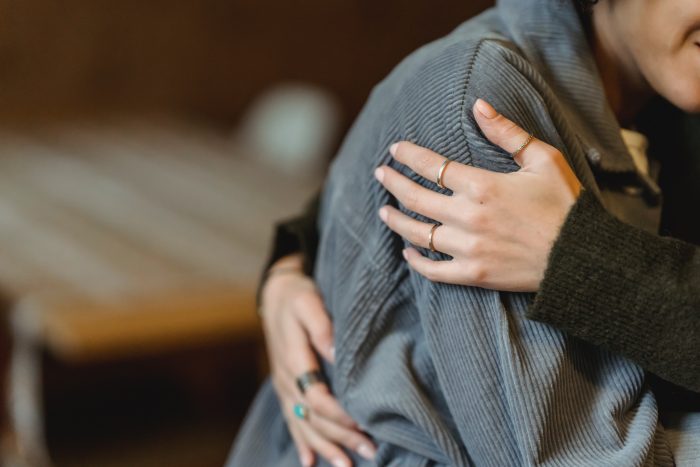I’ve grieved many times in my life.
Most notably was my dad’s girlfriend, Elaine, who died of cancer when I was a teen. I forgave her for cheating with my dad on my mom. I was just a girl, and I saw this woman as having an inner child who needed to be held. I felt the same way. We could have met in our hearts and had a real relationship. There was one toward the end. When she was in the hospital, she was overheated so I suggested patting her down with a washcloth. She said, “I want Sarah to do it.” Our last meeting in a hospice, she said, “I think I’m getting better.” I hugged her, and she didn’t let go at first.
This dance with grief has lasted all my life. Megan Devine says that grief is not a linear experience, despite how the stages of grief have been popularized. Grief instead is a liminal experience. It’s unique to each griever. And we have to stop trying to fix it like it is a problem. Feelings just want to be felt. The same is true of grief.
Grief chisels away what we are not. It makes us self-aware and authentic—we no longer fake it. We feel deeply, and we move the world with that depth. Grief reminds us of what matters. And sometimes, nothing can help with grief but holding space for it and each other. No platitudes of “everything happens for a reason” will ever be enough. Some losses are just senseless. We have to feel to heal. We have to remind ourselves to be human sometimes. It shouldn’t take loss to remind of us that, but often, it does.
Annually 2.5 million people die in the United States, leaving an average of five grieving people behind. Grief can happen to anyone at any time. It’s a human and healthy response to loss and death that deserves honoring. The wreckage and aftermath of grief is a person who is alone with their thoughts and empty of what they once had. When this happens, we have to let grief have its say. We have to listen to it, invite it to be with us.
Grief is what is left of that person we lost, so we don’t really want it to go away. We need to feel the feelings, so we can process the pain. We feel the person deserves that; they deserve our grief.
We hold onto the grief because we don’t really want to say goodbye. When we are experiencing grief, we gain some wisdom, but it doesn’t justify the loss. What we lost can never be replaced. Grief teaches us appreciation for life itself and those we love, and it can change our character, too. It can make us more loving and kind. We can honor that person with our life.
Some quick tips on grief:
>> Know there is no right or wrong way to grieve, that the timeline and the way you grieve will be unique to you.
>> Accept your feelings. Show compassionate attention toward yourself and let go of self-judgments.
>> Express your feelings. Let it out. Find catharsis. Let go.
>> Invest in self-care. You are important and worthy of love, so treat yourself well through this process of grief.
>> Seek support and safe spaces to grieve.
>> Be aware of what triggers your grief and have a plan for when this happens.
>> Ask for help.
>> For further guidance on helping a grieving friend, watch Megan Devine’s video, “How Do You Help a Grieving Friend?”
I will never stop grieving Elaine, but I found solace in these quotes. May they be of benefit.
“Grief is really just love. It’s all the love you want to give, but cannot. All that unspent love gathers up in the corners of your eyes, the lump in your throat, and that hollow part of your chest. Grief is just love with no place to go.” ~ Jamie Anderson
“There are losses that rearrange the world. Deaths that change the way you see everything, grief that tears everything down. Pain that transports you to an entirely different universe, even while everyone else thinks nothing has really changed.” ~ Megan Devine, It’s Ok That You’re Not Ok
“We don’t know how we will grieve until we grieve. I finally understood why people get tattoos of those they have lost. The need to proclaim not merely the loss but the love, the continuity. I am my father’s daughter. It is an act of resistance and refusal: grief telling you it is over and your heart saying it is not; grief trying to shrink your love to the past and your heart saying it is present. It does not matter whether I want to be changed. I am changed.” ~ Chimamanda Ngozi Adichie, Notes On Grief
“I sit with my grief. I mother it. I hold its small, hot hand. I don’t say, shhh. I don’t say, it is okay. I wait until it’s done having feelings. Then we stand and go wash the dishes. We crack open bedroom doors, step over the creaks, and kiss the children. We are sore from this grief, like we’ve returned from a run, like we are training for a marathon. I’m with you all the way, says my grief, whispering, and then we splash our face with water and stretch, one big shadow and one small.” ~ Callista Buchen
“Grief is tremendous, but love is bigger. You are grieving because you loved truly. The beauty in that is greater than the bitterness of death. Allowing this into your consciousness will not keep you from suffering, but it will help you survive the next day.” ~ Cheryl Strayed
“To be human is to grieve.” ~ Aundi Kolber
“Grief is like the stages of love: first falling in love and being totally preoccupied by your new love, then becoming comfortable as you begin to trust that your love will always be with you. In grief, as when you first fall in love, your heart longs to be with the person who’s died. Your desire to touch him or her is overwhelming. Most other parts of your life seem unimportant in comparison. Then slowly, normal life begins to creep back in and you find that your grief no longer demands the high maintenance that it first required. You will have created a special space in your heart where you can carry this departed loved one with you at all times, even as you go about other things. Death ends a lifetime, but not a relationship.” ~ Pat Schwiebert, R.N.
~
Ready to join?
Hey, thanks so much for reading! Elephant offers 1 article every month for free.
If you want more, grab a subscription for unlimited reads for $5/year (normally, it's $108/year, and the discount ends soon).
And clearly you appreciate mindfulness with a sense of humor and integrity! Why not join the Elephant community, become an Elephriend?
Your investment will help Elephant Journal invest in our editors and writers who promote your values to create the change you want to see in your world!
Already have an account? Log in.
Ready to join?
Hey, thanks so much for reading! Elephant offers 1 article every month for free.
If you want more, grab a subscription for unlimited reads for $5/year (normally, it's $108/year, and the discount ends soon).
And clearly you appreciate mindfulness with a sense of humor and integrity! Why not join the Elephant community, become an Elephriend?
Your investment will help Elephant Journal invest in our editors and writers who promote your values to create the change you want to see in your world!
Already have an account? Log in.
 Share on bsky
Share on bsky






Read 7 comments and reply